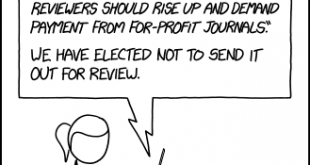[unable to retrieve full-text content]My Interest In The New Goldman Sachs CEO Goes Pretty Much Exactly As You Would Expect…: you see a funny human-interest story, I see a scenario that is potentially helpful for research purposes…
Read More »IPA’s weekly links
Guest post by Jeff Mosenkis of Innovations for Poverty Action. If you can get past me at the beginning, this Planet Money episode The Poop Cartels (Apple/iTunes link), I think shows the power of good econ theory put into practice. Molly Lipscomb of the University of Virginia explains how she, with Laura Schechter, and a big research team in Senegal tried to introduce what some people have also called the “Uber for Poop.” Peter Biar Ajak is a former Sudanese “lost boy” who went on to train...
Read More »I think people might be starting to catch on to the perils of…
[unable to retrieve full-text content]I think people might be starting to catch on to the perils of academic publishing… So does this count as regulatory capture or a form of publication bias?
Read More »I think people might be starting to catch on to the perils of…
[unable to retrieve full-text content]I think people might be starting to catch on to the perils of academic publishing… So does this count as regulatory capture or a form of publication bias?
Read More »What The Brady Bunch Can Tell Us About Housing Market Dynamics
[unable to retrieve full-text content]What The Brady Bunch Can Tell Us About Housing Market Dynamics: These comparisons ended up being way more interesting than I had anticipated…
Read More »What The Brady Bunch Can Tell Us About Housing Market Dynamics
[unable to retrieve full-text content]What The Brady Bunch Can Tell Us About Housing Market Dynamics: These comparisons ended up being way more interesting than I had anticipated…
Read More »A Simple Modern Money Tale – Buckwell Island Establishes a Currency
At one time or another many of us have probably pondered questions such as: Where does a national currency come from? How does a currency system basically work? Why might people agree to accept a national currency in the first place? How can we be confident that a national currency won’t collapse and that people will continue to accept it in economic transactions? Can a government ever go broke and leave citizens footing the bill? Can financial affordability even be an issue for...
Read More »Three Globalizations, Not Two: Rethinking the History and Economics of Trade and Globalization
The conventional wisdom is there have been two globalizations in the modern era. The first began around 1870 and ended in 1914. The second began in 1945 and is still underway. This paper challenges that view and argues there have been three globalizations, not two. The first half of the paper provides empirical evidence for [...]
Read More »Globalization Checkmated? Political and Geopolitical Contradictions Coming Home to Roost
The deepening of economic globalization appears to have ground to a halt and the process may even unravel a little. The sudden stop has surprised economists, whose belief in globalization has strong parallels with Fukuyama’s (1989) flawed end of history hypothesis. The paper presents a simple analytic model that shows how economic globalization has triggered [...]
Read More »The state of ‘New Keynesian’ economics
The standard NK [New Keynesian] model, like most of its predecessors in the RBC literature, represents an economy inhabited by an infinitely-lived representative household. That assumption, while obviously unrealistic, may be justified by the belief that, like so many other aspects of reality, the finiteness of life and the observed heterogeneity of individuals along many dimensions … can be safely ignored for the purposes of explaining aggregate fluctuations and their...
Read More » Heterodox
Heterodox



